Tag Archives: ECD
Posted on July 15, 2016 by Sophie Hicks
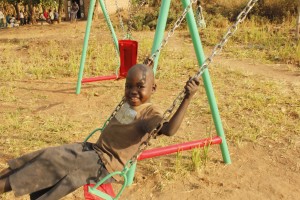
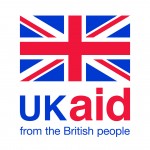
Much of a child’s early years are spent playing, exploring and testing their environment and own personal boundaries. All of this play has significant and proven benefits for a child’s early development. Research has shown that children who regularly engage in play-based learning have better cognitive flexibility, working memory and self-regulation ability.
Here at African Revival, we recognise the immense benefits of play-based learning and have incorporated it as one of the major elements of our jumpstart! nursery education programme. In our 10 jumpstart! schools, we are building playgrounds, training teachers in how to guide play-based learning and make their own play materials using natural materials, and even teaching parents how to encourage productive play at home. We know that play is incredibly important for early childhood development – but what exactly are the top benefits?
- Better behaviour
Children behave better in the classroom when they have had the chance to blow off steam and release energy on the playground during the day. Playing is a known method of stress release that can help with a child’s emotional welfare, as nursery teacher Gino, from Purongo Hill Primary School in Nwoya district says: “the playground is where the children release their stress and refresh their minds between learning”
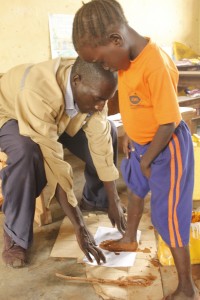
- Good social skills
Play can help young children become more aware of other people’s feelings and develop empathy. During play, whether it is inside or outside of the environment, children must interact and cooperate with each other, as well as share play equipment which requires good communication skills. Children can build relationships, learn to resolve conflicts, negotiate and regulate their emotions and behaviors. According to nursery teacher Gino, increased play-based learning at Purongo Hill has “eliminated that spirit of being selfish, and also helping the children with sharing because of that thing of collaboration”
- Improves academic performance
In 2009, research from the American Journal of School Health found that the more physical activity tests children can pass, the more likely they are to do well on academic tests. According to psychologist Kathryn Hirsch Pasek, “Children learn to count when they’re doing hopscotch […] They are telling stories on the playground, and they’re getting active.”
Furthermore, play can nurture qualities like self-discipline and attentional control, which can be just as vital for school readiness as content knowledge. Children with longer attention spans and self-control can focus more on tasks in the classroom. This is because when children engage in make-believe play that involves role playing, there are generally rules that they must follow which involves regulating their natural self and behavior. By practicing this in a safe, fun environment, their self-control is enhanced, which can then be transferred to a classroom setting.
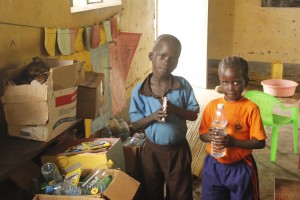
- Language development
Moreover, make-believe play that involves role playing can also help children to develop their language skills, as was shown in a British study (Lewis, 2000). Infant pupils were asked to engage in symbolic play, whereby they use objects, actions or ideas to represent other objects, actions or ideas. For example, a child may put a wooden block to her ear as a pretend mobile phone. Children who scored higher on a test of symbolic play had better language skills, both in terms of what they understood and spoke. This suggests that play helps to develop and solidify language skills.
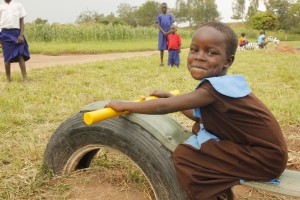
- Increases enthusiasm for learning
In northern Uganda, where drop out rates amongst primary school students are very high, play-based learning can encourage pupils to stay in school and attend more frequently. Indeed, at Purongo Hill Primary School in Nwoya district, nursery teacher Gino says that enrolment has skyrocketed since African Revival constructed a playground at the school (from 30 pupils in the nursery section to 120): “the playground has been an advantage to us because it has drawn in children, increased enrolment and reduced drop outs”.
Posted in News |
Tagged Acholi, African Revival, Development, ECD, Headteacher, inspiration, Inspiring Head Teacher, International Development, Jumpstart!, play, Teacher training, Uganda |
Leave a comment
Posted on June 16, 2016 by Sophie Hicks
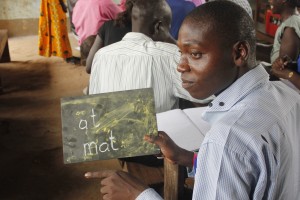 African Revival recently organised a 3- day phonics training for Koch Goma Primary School with phonics trainers Jody Spencer and Akello Catherine. Jody and Catherine used the Fun of Phonics curriculum, which has been adapted by Jody from international phonics programmes to fit the local teaching environment in Uganda. Teachers were trained in a multisensory synthetics phonics approach using actions and song, and practiced using teaching methods such as pair reading.
African Revival recently organised a 3- day phonics training for Koch Goma Primary School with phonics trainers Jody Spencer and Akello Catherine. Jody and Catherine used the Fun of Phonics curriculum, which has been adapted by Jody from international phonics programmes to fit the local teaching environment in Uganda. Teachers were trained in a multisensory synthetics phonics approach using actions and song, and practiced using teaching methods such as pair reading.
But what is phonics? How is it different from teaching children to read using the rote memorization technique? And why is it so effective? Find out all you ever wanted to know about phonics here!
What is phonics?
Phonics is a method of teaching reading and writing that focuses on sounds. In the English language there are only 26 letters in the alphabet, however there are 44 sounds and 120 main ways of writing these sounds. Phonics teaches children to recognise and write these sounds by training them to correlate these different sounds (phonemes) with letters (graphemes).
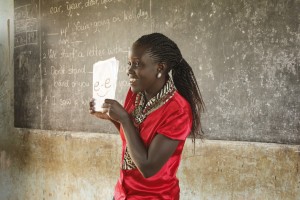 Take an example
Take an example
Phonemes are the smallest units of sound that make up a word.
Take the word ‘star’. While it consists of only one syllable, it contains four different phonemes: /s/ /t/ /a/ /r/. When teaching phonics, children will be taught the sound each phoneme makes, then how to put these sounds together to sound out the whole word.
Some sounds have one letter, while others have two or three. For example, the word ‘fish’ has four letters but only three sounds – the letters ‘sh’ make one sound but are two letters.
Why is phonics an effective teaching method?
A written language is basically a kind of a code. Teaching phonics is just teaching children to crack that code by learning to recognize the sounds of letters and different letter combinations. Children learn the simple bits first and then easily progress to get the hang of the trickier bits. Phonics gives children the skills to decode new words that they have not been taught by sounding them out, therefore equipping them with the skills to read and write independently.
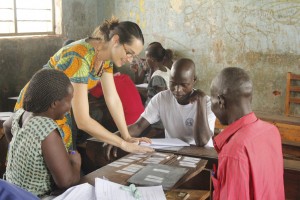 Is phonics effective?
Is phonics effective?
Yes. A study in the UK led by Educational Psychologist Marlynne Grant has shown the effectiveness of phonics instruction at nursery and primary level. The study followed a group of 30 children who were taught using phonics for the first time in nursery, and tracked their progress for three years, to the end of year two in primary school. Grant’s research found that in 2013, members of the year two class of seven-year-olds were on average 28 months ahead of their chronological age for reading and 21 months above their age for spelling.
Why is rote learning not effective?
Rote learning is a memorisation technique centred on repetition and cramming. It is based on the idea that the more a child repeats a piece of information, the quicker they will be able to recall it. However, this quick recall often comes at the expense of a deeper understanding because rote learning does not focus on comprehension.
In Uganda, pupils are often taught English using this rote learning method. Children are taught to repeat and memorize particular sentences and words, but are not taught how to decipher specific sounds in words. This means that some children can read words they have already been taught, but cannot tackle new words on their own. Other children, however, find it difficult to memorize words and can progress through primary school with a limited reading ability. Many children leave primary school without being able to read independently when taught using rote memorization.
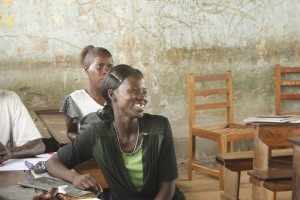 What are literacy levels in Uganda?
What are literacy levels in Uganda?
Across Uganda, one third of youth are illiterate and pass rates for English amongst children aged 10-16 are only 47% (Uwezo). In many schools, especially those in poorer rural areas, quality of education remains poor and teachers lack practical skills and educational resources. Many children leave school without the ability to read simple sentences that they have not already been taught.
Why does literacy matter?
Children’s poor skills in reading and writing have a direct result on their results in other academic subjects such as mathematics and science because the main academic language for exams in primary school is English. Children who cannot read and understand questions for these subjects often perform poorly in exams and do not develop literacy skills vital for success in the workplace and beyond.
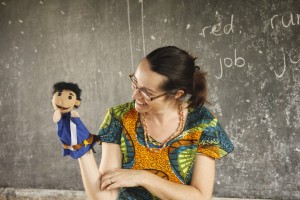 How can training teachers in phonics help improve literacy levels?
How can training teachers in phonics help improve literacy levels?
The root cause of illiteracy is the way teachers are trained in Uganda. In general, they are taught to use rote memorisation to train pupils to read and write, often graduating from Primary Teaching College without being confident in teaching English. In some rural schools, some teachers struggle with the English language themselves following years of poor instruction, so struggle to teach the language in the classroom. Moreover, they lack skills in effective, research-based teaching methods which engage learners. By training teachers in phonics methodology, they will be equipped with the skills to teach children how to decode new words and give them the framework to independently develop their literacy level. Strong literacy skills will help students to improve their performance in other subject areas, with general comprehension across subjects enhanced by the ability to read and write well.
Posted in News |
Tagged African Revival, Changemaker, Development, ECD, Education, Gulu, inspiration, Inspiring Head Teacher, International Development, Jumpstart!, Nursery School, School Development, Teacher training |
Leave a comment
Posted on February 23, 2016 by Sophie Hicks
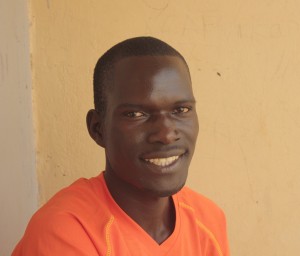

Sunday is only 22 years old, yet already he is the headteacher of Lacek Community School in Nwoya district! To hold such an important position at such a young age is testimony to both his considerable talents as a teacher and to how highly he is considered in the surrounding community. But Sunday is not just a Headteacher. He is also participating in the Teacher Changemaker network, which we coordinate in partnership with STIR Education in Northern Uganda! So far, Sunday has implemented an incredibly successful Village Savings and Loans Association in Lacek School (they have saved an impressive 3,775,400 since May) which is also helping to bring parents closer to the school to monitor their children’s education, improving student motivation and performance. Read on to discover how Sunday is changing the way the local community views education and impacting on the next generation at Lacek Community School!
My parents were escaping from the Lord’s Resistence Army, so I was born in Gulu. But our original homeland is in Kinene. We moved back to Kinene in 2006 when the war ended. I was 13 years old. I have only 3 brothers without any girls. My mother gave birth to 4 girls but they all passed away. There were only 4 boys left. I have four half brothers and sisters from my fathers second wife. We all live together in Kinene. My father had many wives, almost 11. He is 80 years old now.
Teaching became interesting to me because of a certain teacher in my primary, called Mr Laloo. That teacher really made me who I am. I struggled to learn English, so he put a lot of work into teaching me how to speak and write well. I liked the way he taught me, and I promised to myself I would become a teacher.
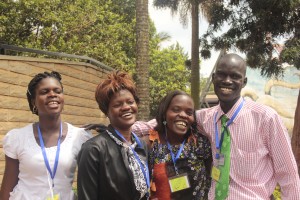 Being part of the Teacher Changemaker network made me realise that the problem in our schools is parent engagement. It touches me. There is a lack of parent engagement in these communities – parents have very negative attitudes towards education. I saw that many were not able to pay their children in school. I sat down with the School Management Committees and asked, which is the best way we can help these parents? I decided to bring the Village Savings and Loans Association (VSLA), which other localities are doing successfully. When they save money for 2 months, that money alone is able to pay the school fees for their children. So I decided to mobilize parents. Many parents joined me. Every week they come and save their money in the pool. So far they have saved 3,775,400 (since May 2015).
Being part of the Teacher Changemaker network made me realise that the problem in our schools is parent engagement. It touches me. There is a lack of parent engagement in these communities – parents have very negative attitudes towards education. I saw that many were not able to pay their children in school. I sat down with the School Management Committees and asked, which is the best way we can help these parents? I decided to bring the Village Savings and Loans Association (VSLA), which other localities are doing successfully. When they save money for 2 months, that money alone is able to pay the school fees for their children. So I decided to mobilize parents. Many parents joined me. Every week they come and save their money in the pool. So far they have saved 3,775,400 (since May 2015).
Children are getting benefits from their parents being in the VSLA. Their parents can borrow money and pay them, buy for them uniform, the scholastic materials. Also, the parents are able to monitor their children, whether they are in the class, whether they are learning. They first move around all the school compound checking what is wrong, what is good, and they feedback later.
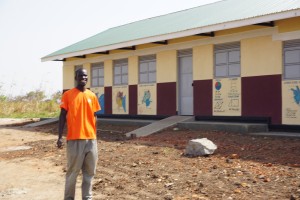 In our culture, when you are a teacher, people prefer to be like you, because teachers are able to make unknown known. So people take teachers as the most important thing for the community. The change makers. Whenever there are any problems they first consult the teacher. During village meetings, I am always the chief’s guest when they are making bylaws. I help them to decide which ways to manage the schools and build the community. And when we are making school rules, we invite the chiefs to help. So when the child is not at school, we can give a phone call to the chief to inform him about the problem within his area of service.
In our culture, when you are a teacher, people prefer to be like you, because teachers are able to make unknown known. So people take teachers as the most important thing for the community. The change makers. Whenever there are any problems they first consult the teacher. During village meetings, I am always the chief’s guest when they are making bylaws. I help them to decide which ways to manage the schools and build the community. And when we are making school rules, we invite the chiefs to help. So when the child is not at school, we can give a phone call to the chief to inform him about the problem within his area of service.
I am getting some great advice from the network, like its OK to make mistakes. For us we take mistakes as a very bad thing. When we make mistakes in the Ugandan education system, people do not like it. But when I see anyone making mistakes, I just help them, and do not tell them off. The network always tells us that through mistakes, you can learn.
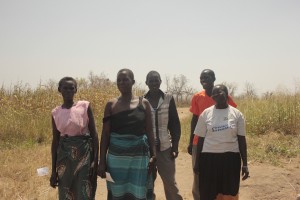 The part of the network that has motivated me a lot is friendship. Before, I didn’t know any of the other teachers in Nwoya district who are now in the network. I speak with my friend Gino (a pre-primary teacher at Purongo Hill Primary School) by phone almost daily. We just call each other and share the things from our day.
The part of the network that has motivated me a lot is friendship. Before, I didn’t know any of the other teachers in Nwoya district who are now in the network. I speak with my friend Gino (a pre-primary teacher at Purongo Hill Primary School) by phone almost daily. We just call each other and share the things from our day.
In the future, after going for my ECD diploma, I’m hoping to be a tutor and train teachers in Early Childhood Development. I can see myself so much specialised in the ECD because I understand young children’s behaviour.
My daughter, she is very stubborn! She is around 2 years old. At around 1 ½ years, she was also able to speak. She acquired language very early. I play with her everyday, even if she is not understanding everything I say. She is called Akello Charity Hope. She loves playing, she plays so much. When I reach home in the evening, we sing songs together. I will arrive and she will immediately come to me to sing songs, to speak funny things. In the future I want her to be like me – a teacher.
Posted in News |
Tagged Acholi, African Revival, Changemaker, Development, ECD, Education, endurance, Gulu, Headteacher, inspiration, International Development, Interview, Jumpstart!, Kampala, Nursery, Nursery School, Profile, Pupils, School, School Development, STIREducation, Teacher training, Uganda, World Teachers' Day |
Leave a comment
Posted on February 17, 2016 by Sophie Hicks
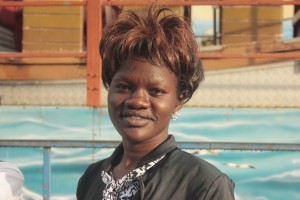

Irene started her early career as a tap dancer. Trained for a year by a man from California named Jack, she still has a real passion for the dance with ‘the glass shoes’. Now an Early Childhood Development teacher in Anaka P7 Primary School in Nwoya district, Northern Uganda, she regularly brings song and dance into her lessons as a way of energising her pupils and bringing her classroom alive. This interactive style of teaching is just one of the things she has learned from participating in Teacher Changemaker network, implemented by STIR Education and coordinated in Nwoya district by African Revival.
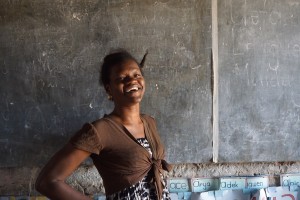 The Teacher Changemaker network encourages teachers across Uganda to introduce ‘micro innovations’, new techniques to increase the quality of education, into their lessons to respond to the challenges they face in the Ugandan education system. For Irene and her colleagues at Anaka P7, one of the main challenges is lack of parental engagement: “We decided that parental engagement is the biggest problem affecting our school. There are parents that, when you call them for a meeting, they don’t want to come. They don’t provide the scholastic materials for their children. You find a child will come to school hungry, without having eaten, and not be able to concentrate in class. Children like this end up failing.” She and her fellow teachers have introduced a procedure to counteract this challenge: “The first step is to call the parents for a meeting. The second stage is to go up to the home to see what is the problem stopping this child from performing. And the time comes when the parents start to listen, slowly, until they are now following the advice of the teacher. We have used this procedure and now there are many who come to check the progress of the children”. This micro innovation is already having positive results. This year, more children in Irene’s class passed, and she has noticed a change in the attitude of her students in class, now their parents are taking more of an interest in their education.
The Teacher Changemaker network encourages teachers across Uganda to introduce ‘micro innovations’, new techniques to increase the quality of education, into their lessons to respond to the challenges they face in the Ugandan education system. For Irene and her colleagues at Anaka P7, one of the main challenges is lack of parental engagement: “We decided that parental engagement is the biggest problem affecting our school. There are parents that, when you call them for a meeting, they don’t want to come. They don’t provide the scholastic materials for their children. You find a child will come to school hungry, without having eaten, and not be able to concentrate in class. Children like this end up failing.” She and her fellow teachers have introduced a procedure to counteract this challenge: “The first step is to call the parents for a meeting. The second stage is to go up to the home to see what is the problem stopping this child from performing. And the time comes when the parents start to listen, slowly, until they are now following the advice of the teacher. We have used this procedure and now there are many who come to check the progress of the children”. This micro innovation is already having positive results. This year, more children in Irene’s class passed, and she has noticed a change in the attitude of her students in class, now their parents are taking more of an interest in their education.
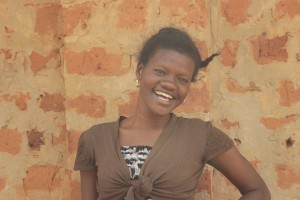 Irene is confident that the innovations and increased focus on critical analysis and problem solving that the Changemaker network has facilitated will continue to have a positive impact on her primary school: “as long as we keep innovations coming to Anaka p7, there will be a great many positive changes. Though we have some parents who don’t listen to the school, in time there will be a lot of improvements because us teachers have learned ways of solving the problems we face”
Irene is confident that the innovations and increased focus on critical analysis and problem solving that the Changemaker network has facilitated will continue to have a positive impact on her primary school: “as long as we keep innovations coming to Anaka p7, there will be a great many positive changes. Though we have some parents who don’t listen to the school, in time there will be a lot of improvements because us teachers have learned ways of solving the problems we face”
The network is also having a positive impact on Irene’s confidence and motivation as a teacher: “The network taught me that, if you are a teacher, you should have confidence in everything you do, you should be exemplary, you should have knowledge, you should be someone who searches for things that will make a change. Someone creative in the mind who will search for ways to make the children learn well and pass”.
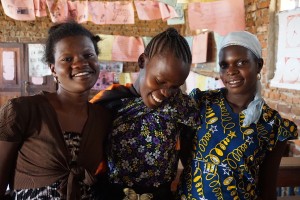 She also enjoys the unity and collaboration with the other Teacher Changemakers, which is a real advantage for all participants. Teaching in any part of the world can be a difficult job, and in Uganda the lack of good infrastructure, teaching materials and training exacerbates the already considerable challenges. By encouraging teachers to share and support each other, the Teacher Changemaker network is looking to alleviate these challenges through an informal support system that allows participants to vocalise their problems and search for solutions together. This style of network also means that innovations produced by the teachers are tailored to the specific localised environments across Uganda, rather than ready-made solutions designed out of context. This contributes to the success of the network and its popularity amongst its Changemakers, especially Irene, who advised teachers to try out the new Changemaker innovations for themselves: “My advice for other teachers is this: go and put the micro innovations into use, because they will help a lot. And help you learn how to communicate with others, discuss, be social and cooperative and many others. When you go back to school tell others to do the same!”
She also enjoys the unity and collaboration with the other Teacher Changemakers, which is a real advantage for all participants. Teaching in any part of the world can be a difficult job, and in Uganda the lack of good infrastructure, teaching materials and training exacerbates the already considerable challenges. By encouraging teachers to share and support each other, the Teacher Changemaker network is looking to alleviate these challenges through an informal support system that allows participants to vocalise their problems and search for solutions together. This style of network also means that innovations produced by the teachers are tailored to the specific localised environments across Uganda, rather than ready-made solutions designed out of context. This contributes to the success of the network and its popularity amongst its Changemakers, especially Irene, who advised teachers to try out the new Changemaker innovations for themselves: “My advice for other teachers is this: go and put the micro innovations into use, because they will help a lot. And help you learn how to communicate with others, discuss, be social and cooperative and many others. When you go back to school tell others to do the same!”
Posted in News |
Tagged Acholi, African Revival, Changemaker, Development, ECD, Education, inspiration, International Development, Jumpstart!, Kampala, Kilimanjaro, Nursery, Nursery School, Profile, Pupils, School, School Development, STIREducation, Teacher, Teacher training, Uganda |
Leave a comment
Posted on February 11, 2016 by Sophie Hicks
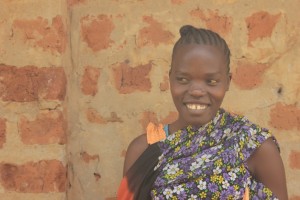 Kevin, aged 23, is a primary teacher from Anaka P7 Primary School, and a fantastic Teacher Changemaker! She is participating in STIR Education’s Teacher Changemaker network, which is designed for teachers to share ideas and innovations, as well as to provide a source of motivation for educators in what can be a difficult working environment. African Revival’s Jumpstart! team has been helping STIR to manage the network in Nwoya district, where we caught up with Kevin to find out how the Changemaker network is benefitting her and her students!
Kevin, aged 23, is a primary teacher from Anaka P7 Primary School, and a fantastic Teacher Changemaker! She is participating in STIR Education’s Teacher Changemaker network, which is designed for teachers to share ideas and innovations, as well as to provide a source of motivation for educators in what can be a difficult working environment. African Revival’s Jumpstart! team has been helping STIR to manage the network in Nwoya district, where we caught up with Kevin to find out how the Changemaker network is benefitting her and her students!
I teach in the primary section of Anaka P7. I like the lower primary classes because they are young and friendly, so I enjoy interacting with them. The Teacher Changemaker network has given me a lot of methods about how to handle children, especially children with behavioural problems. It has given me more skills to handle the stubborn ones, the latecomers, and others with different problems.
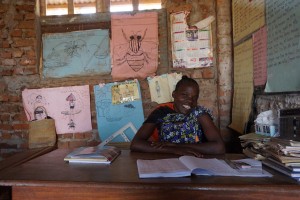 The best thing about being part of the Teacher Changemaker network is that we meet many Changemakers who give us many new skills. I have learnt the qualities of a good teacher, how to handle the classroom situation and how to make the classroom into a good learning environment.
The best thing about being part of the Teacher Changemaker network is that we meet many Changemakers who give us many new skills. I have learnt the qualities of a good teacher, how to handle the classroom situation and how to make the classroom into a good learning environment.
Being a Changemaker means being a teacher who is an all rounder, being a teacher who has a growth mind-set not a fixed mind-set and a teacher who is always ready for anything. As a Changemaker, you have to practice what you preach. You have to be innovative, influential, creative and motivate the learners.
This year I will use one micro innovation that I call ‘I do, we do, you do’. I will first do on my own as the learners watch and learn from me. Then ‘we do’ together. Then ‘you do’ – one particular learner will do as I observe and correct the work. We had some training about this. I’ve tried it before and it always works very well. Even during our teacher training, we do the exercises like this and it’s a nice technique.
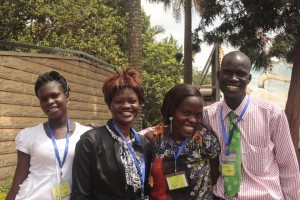 Since being involved in the Teacher Changemaker network, I have one success story about a child who didn’t enjoy learning. The child came from a long distance away, so the problem was lack of lunch, because at school we don’t provide food for the learners. I decided to talk to the parents of the child to make a plan. I started by advising them that in life there is mostly one thing: if the stomach is full, the brain will be open to learning new things, but if the stomach is complaining, the brain is focused on the stomach. The parents followed my advice and sent the child to school with packed lunch. Soon after, the learning behaviour of the child changed – they came to school early and concentrated in class. When the year ended last year, the child passed very well. After I saw the positive progress of the child, I told my fellow Changemakers in my school about the procedure I had used.
Since being involved in the Teacher Changemaker network, I have one success story about a child who didn’t enjoy learning. The child came from a long distance away, so the problem was lack of lunch, because at school we don’t provide food for the learners. I decided to talk to the parents of the child to make a plan. I started by advising them that in life there is mostly one thing: if the stomach is full, the brain will be open to learning new things, but if the stomach is complaining, the brain is focused on the stomach. The parents followed my advice and sent the child to school with packed lunch. Soon after, the learning behaviour of the child changed – they came to school early and concentrated in class. When the year ended last year, the child passed very well. After I saw the positive progress of the child, I told my fellow Changemakers in my school about the procedure I had used.
The happiest moment I have ever had is when I graduated from teaching college. I found that during my school practice I got an A! I celebrated this moment, because it’s the moment I became a qualified teacher.
I want to go to the next level of education. I want to do a degree in primary education. If I can, I’ll try East African International University in Kampala where this year’s STIR Education summit was held. I will work very hard to achieve this goal.
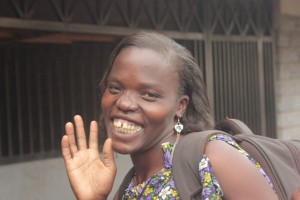 My role model is my dad because he is a teacher, so I’ve also decided to take his profession. He is a head teacher in St.Luke’s Primary School in Nwoya district. I always look at what he does and admire him because he is funny, friendly and nice.
My role model is my dad because he is a teacher, so I’ve also decided to take his profession. He is a head teacher in St.Luke’s Primary School in Nwoya district. I always look at what he does and admire him because he is funny, friendly and nice.
If I could give one piece of advice to a group of people it would be to be comfortable with change. They should not be static. If change comes, they should be open to new things. Like if a new teaching innovation is introduced we should embrace it.
Posted in News |
Tagged African Revival, Changemaker, Development, ECD, Education, Gulu, inspiration, International Development, Jumpstart!, Kampala, Nursery School, School Development, STIREducation, Teacher, Teacher training, Uganda |
Leave a comment
Posted on September 29, 2015 by Sophie Hicks
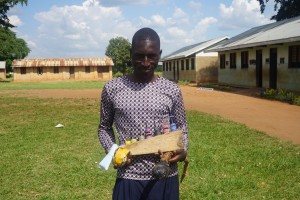 Kuluse, 25, is a nursery teacher in Kamboli district in Northern Uganda. He has just finished his training in Early Childhood Development and nursery education at Gulu Primary Teaching College. Newly qualified and raring to go, Kuluse draws his motivation from his students’ passion for life and learning. Kuluse shared his teaching experiences with African Revival when we met him at a Jumpstart ! teacher training
Kuluse, 25, is a nursery teacher in Kamboli district in Northern Uganda. He has just finished his training in Early Childhood Development and nursery education at Gulu Primary Teaching College. Newly qualified and raring to go, Kuluse draws his motivation from his students’ passion for life and learning. Kuluse shared his teaching experiences with African Revival when we met him at a Jumpstart ! teacher training 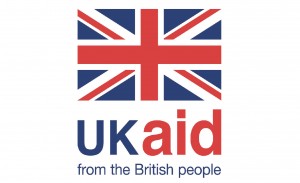 session, implemented by our Education team and funded by the UK Department for International Development’s UKAid match programme.
session, implemented by our Education team and funded by the UK Department for International Development’s UKAid match programme.
I first started as a part time teacher. Later I joined a training course to become a teacher. I joined ECD training because I felt love for the children. I never wanted to be a teacher, I was just fascinated by the childen’s behavior. I enjoy most of the learning areas, but I love observing the children’s lifestyles, seeing how they try to relate to each other and watching them develop as people. I enjoy watching them be creative, its the part of the teaching I really enjoy.
I enjoy teaching maths. It was one of my favourite subjects during my childhood, right until I reached my advanced level. I still took maths as part of my A level combination, so naturally I love maths.
There are challenges that you face as a teacher when joining a school. One of the challenges is that we are a young school, so we are still lacking a lot of materials, but we want to appreciate African Revival because they have always given us support. Another thing is the parents; they are not very encouraging, they were speaking badly about the school.
But the good thing is, the time I spend with the children in class, it makes me feel very relaxed. Sometimes I don’t even feel like releasing them to go home, because when I’m with them I’m enjoying my time. My children don’t want to leave. One time they said ‘teacher we are going with you !’ so they don’t feel like leaving. They enjoy it so much. Sometimes after the daily routine, they sit down and say, teacher now it is time to dance. The traditional cultural dances – they enjoy it so much.
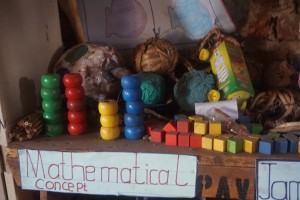 I’ve really achieved a lot by attending this [Jumpstart !] training. In fact yesterday I didn’t sleep. I spent most of the night working on my learning aids, because I felt like if I spend the time now, I will make a lot of things that will help me in class.
I’ve really achieved a lot by attending this [Jumpstart !] training. In fact yesterday I didn’t sleep. I spent most of the night working on my learning aids, because I felt like if I spend the time now, I will make a lot of things that will help me in class.
During training we learnt about how we can take part in developing the school. We should sell our school by the commitment that we give to the children. We should not mind the current situation and work hard to build a better quality, and once the quality comes, it will sell the name of the school and attract the parents’ attention towards the school. Then there are other ways, like materials that we use. We shall be creative so that the money that we could have used on buying these learning materials, we save it for other things.
The best thing I got [from attending these workshops], is that I shared the experience with my colleagues. Things that I never knew how to do, I learned from my colleagues, because the trainers encouraged us to have group work activities, so we worked well in teams.
My wish for my school is first class knowledge. Most of the knowledge I’m having here, I want to go and share it with my fellow staff to make sure we take our school to the best level of education standards. I also wish that, in sometime to come, I shall be one of the authors of, or write a book that will help teachers know how to pursue their teaching dream.
Nursery education is the foundation of our nation.
If the foundation is built well, our dreams for Uganda will all come to pass.
Posted in News |
Tagged ECD, Education, Gulu, Jumpstart!, Nursery, School, Teacher training, Uganda |
Leave a comment
Posted on September 24, 2015 by Sophie Hicks
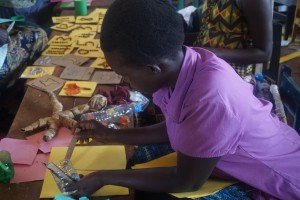 When we visited the classrooms at Anaka Primary 7, every inch of wall space was occupied by colourful learning aids depicting letters, numbers and local folk tales. The school was hosting an African Revival Jumpstart! training workshop for teachers from local nursery schools that focused on:
When we visited the classrooms at Anaka Primary 7, every inch of wall space was occupied by colourful learning aids depicting letters, numbers and local folk tales. The school was hosting an African Revival Jumpstart! training workshop for teachers from local nursery schools that focused on:

- How to make learning aids from raw local materials at nursery level
- Using learning resources in the local Acholi language
The participants learned how to source raw materials from the natural environment and use them to make a variety of educational equipment in the local Acholi language.
Local materials are an incredibly cheap source of learning aids, and also familiar to the children, which helps to facilitate their understanding of new concepts. Teacher trainer Martina explained how using learning aids made of local materials can help children to master their environments:
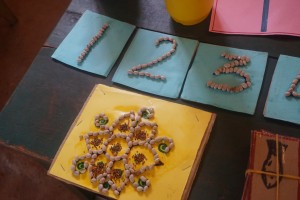
‘The children develop a precision for what is in their environment. When they see a pot made of clay, they know what clay is called, they begin to value and appreciate their environment and later they can also develop skills in making those materials themselves, helping them professionally later on.’
Furthermore, nursery-teaching resources written in the local Acholi language enhance the students’ learning because it is the language they use at home.
The language of instruction throughout the schooling system in Uganda is English. However, research confirms that children learn best in their mother tongue as a prelude to bilingual education because it allows them to develop stronger reading, writing and mathematical skills. This lays the foundations for their future education and acquisition of more complex concepts. Moreover, using Acholi language materials can boost the self-confidence and motivation of pupils and increase their interest in what they are learning – because they understand it! Martina described the benefits of using Acholi learning aids:
‘Firstly, the children in the nursery schools are still developing their language and still using the local language at home. So we hope that, when they come to school and get materials in the local language, they will develop their language skills fast because they understand it. At home we call a pot ‘agulu’ – when they come to school they also find ‘agulu’, so they develop reading and writing skills faster.
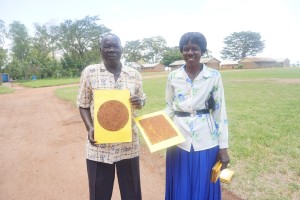
But teacher trainer Ojok Ojara, who underwent two years of ECD teacher training in Australia, admits there are some challenges persuading the local communities of the benefits of teaching nursery and primary classes in Acholi:
‘People think that when you teach in Acholi, you are not teaching in English. But you can teach in both! Let the children develop the language they really use at home, let them master it. They will learn the second language very quickly.’
Ojok Ojara is now advocating for the introduction of English only after children have completed class 3 of primary school, aged 8. Indeed, children who have a firm grounding in Acholi and have been given the opportunity to develop skills and conceptual understanding in their mother tongue, will learn English quicker than children who have been instructed purely in English. In addition, they are more empowered as learners when taught in their mother tongue, which they can now study all the way to university level in the Ugandan education system
The African Revival training focused on the importance of the use of Acholi in the classroom, while also showing participants practical ways of incorporating the language into the classroom using handmade learning aids. Trainers Martina and Ojok Ojara expressed their firm hope that the teachers would take away the new techniques and adapt them to their own classrooms, and plan to monitor their progress. But the level of motivation amongst the trainees is high. When asked if he enjoyed the training sessions, nursery teacher Kuluse admitted:
‘Yes! In fact yesterday I didn’t sleep. I spent most of the night working on my learning aids, because I thought I will make a lot of things that will help me in class, so I’ve really achieved a lot in this training.’
 We hope he doesn’t stay up every night making new resources – teaching is a tiring job! Kuluse is clearly very passionate continuing professional development for teachers, which he sees as the key to raising education standards in Uganda, and hopes to share his new knowledge with his colleagues. He also views Early Childhood Development as integral to his nation’s progress:
We hope he doesn’t stay up every night making new resources – teaching is a tiring job! Kuluse is clearly very passionate continuing professional development for teachers, which he sees as the key to raising education standards in Uganda, and hopes to share his new knowledge with his colleagues. He also views Early Childhood Development as integral to his nation’s progress:
‘Nursery education is the foundation of our nation. If the foundation is built well, our dreams for Uganda will all come to pass’
With more and more Acholi being introduced into nursery education, in conjunction with vibrant, engaging and locally sourced learning aids, we are sure this foundation is growing stronger by the day.
Posted in News |
Tagged African Revival, ECD, Education, International Development, Nursery School, Uganda |
Leave a comment
Posted on September 18, 2015 by Elaine Miller
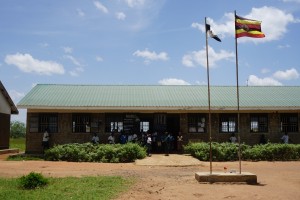 Our Education Jumpstart! team is currently busy conducting Centre Development
Our Education Jumpstart! team is currently busy conducting Centre Development
Plan workshops, in which CMC (Centre Management Committee) members, PTA
(Parents-Teacher-Association) members, SMC (School Management Committees) members and caregivers are trained in developing a Centre Development Plan (CDP) for
their ECD centre. Last week, a two-days workshop was held at St Kizito Bidati Nursery School. With all parties attending, there were 10 enthusiastic and willing ‘learners’, eager to develop a 3-year-plan with one main goal: Quality Education!
The workshop followed three clearly defined objectives:
- Understand planning in the context of Centre Development Plan
- Identify areas that can be considered in that plan
- Understand the steps involved in the development plan
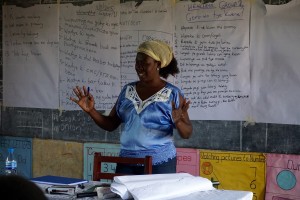 The key word for these workshops is empowerment: We help and guide them through the process of developing their Centre Management Plan by giving them incentives, asking questions and providing some constructive assistance when needed – but it is our participants that come up with concrete ideas which will then translate into their own, individual, customised Centre Development Plan! Right from the start, it is especially important to our Education Programme Coordinator Richard for everyone to realise how quality education can be achieved:
The key word for these workshops is empowerment: We help and guide them through the process of developing their Centre Management Plan by giving them incentives, asking questions and providing some constructive assistance when needed – but it is our participants that come up with concrete ideas which will then translate into their own, individual, customised Centre Development Plan! Right from the start, it is especially important to our Education Programme Coordinator Richard for everyone to realise how quality education can be achieved:
“A lot of school development plans focus on improving infrastructure. However, that doesn’t always have to translate into quality education! Teachers, for example, are much more essential – whatever you invest in their training and development will provide quality education!”
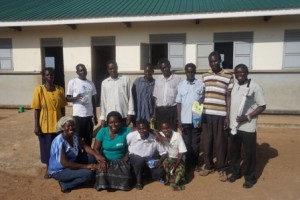 The participants at St Kizito Bidati quickly understood that quality education can only be achieved through a multifaceted approach. This is why, on DAY I, they identified four key areas which their CDP shall focus on: First of all, special emphasis shall be put on (1) ‘Curriculum delivery’ – This means it’s all about the teachers, their training, refresher workshops and adequate materials, but also their motivation from the parents. Here, Julius, a CMC member, stresses
The participants at St Kizito Bidati quickly understood that quality education can only be achieved through a multifaceted approach. This is why, on DAY I, they identified four key areas which their CDP shall focus on: First of all, special emphasis shall be put on (1) ‘Curriculum delivery’ – This means it’s all about the teachers, their training, refresher workshops and adequate materials, but also their motivation from the parents. Here, Julius, a CMC member, stresses
“If you motivate the teachers, they will love your children more. If you care about this, about the teachers, they will have a set mind, they will care about a only your children, not worry about anything else.”
 The second key area is (2) ‘Child-friendly learning environment’. The main focus will be ‘Creating a talking classroom’. This will involve investing in resources, so that at the end of the day, the classrooms are talking for themselves. However, an eye shall also be put on improving outside playing materials and providing enough shade for the children to play outside. Additionally, ensuring a clean and safe environment as well as a clean water source are also part and parcel of this key area. Thirdly, ‘school infrastructure’ (3) shall be improved through, for example, the construction of a bathing facility. Last but not least, boosting (4) ‘parental involvement’ is the fourth key area identified. They are aiming at sensitising parents on the value of ECD through events such as Parents Open Days. Additionally, they came up with another great idea to raise awareness about the importance of ECD: In Uganda, elections are coming up next May and local leaders have already been busy campaigning; the people from Bidati will try to convince some of these local leaders to include ECD in their manifestos! Parental involvement is a key issue for a sustainable change at every school, and at St Kitizito Bidati. This was also evident when looking at development partners and stakeholders. In this respect, as much as the support by NGOs is extremely valuable in these communities, it is decisive to look at them as an additional source of funding that can contribute to areas where parents lack sufficient funding.
The second key area is (2) ‘Child-friendly learning environment’. The main focus will be ‘Creating a talking classroom’. This will involve investing in resources, so that at the end of the day, the classrooms are talking for themselves. However, an eye shall also be put on improving outside playing materials and providing enough shade for the children to play outside. Additionally, ensuring a clean and safe environment as well as a clean water source are also part and parcel of this key area. Thirdly, ‘school infrastructure’ (3) shall be improved through, for example, the construction of a bathing facility. Last but not least, boosting (4) ‘parental involvement’ is the fourth key area identified. They are aiming at sensitising parents on the value of ECD through events such as Parents Open Days. Additionally, they came up with another great idea to raise awareness about the importance of ECD: In Uganda, elections are coming up next May and local leaders have already been busy campaigning; the people from Bidati will try to convince some of these local leaders to include ECD in their manifestos! Parental involvement is a key issue for a sustainable change at every school, and at St Kitizito Bidati. This was also evident when looking at development partners and stakeholders. In this respect, as much as the support by NGOs is extremely valuable in these communities, it is decisive to look at them as an additional source of funding that can contribute to areas where parents lack sufficient funding.
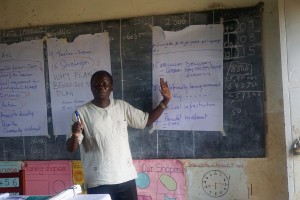 On DAY II, they were ready to get into the details and started off with a SWOT/SCOT (Strengths, Weaknesses/Challenges, Opportunities, Threats) analysis of their school. This is done for specific purpose:
On DAY II, they were ready to get into the details and started off with a SWOT/SCOT (Strengths, Weaknesses/Challenges, Opportunities, Threats) analysis of their school. This is done for specific purpose:
“We want them to see everything in order to make them aware of what is going on how they can use their opportunities to erase their weakness & strengths.”(Richard)
As the ECD centre is only in its nascent stage, it is faced with several challenges andweaknesses, ranging from a lack of classroom, bathing facilities, shades and playing and learning material to high rates of absenteeism in rainy and harvest seasons and rather low 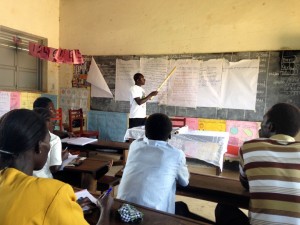 parental involvement. And poverty continues to plague the communities in the region, ultimately representing a threat to the mere maintenance of the nursery. However, they hope to tackle these issues by drawing on their strengths, such as dedicated and qualified teachers, committed CMC members, good enrolment and valuable support of the primary section, and exploiting their ‘opportunities’, may it be through cultivating bare school land for meals for the children or bringing more parents as well as children on board through greater community sensitisation.
parental involvement. And poverty continues to plague the communities in the region, ultimately representing a threat to the mere maintenance of the nursery. However, they hope to tackle these issues by drawing on their strengths, such as dedicated and qualified teachers, committed CMC members, good enrolment and valuable support of the primary section, and exploiting their ‘opportunities’, may it be through cultivating bare school land for meals for the children or bringing more parents as well as children on board through greater community sensitisation.
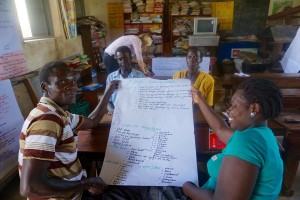 Before everyone was off for the weekend, they started to get to the details, having a look at what resources and expenses will be necessary in order to implement their CDP. Participants were split up into groups. Coincidentally, their results perfectly complemented each other: While the first focused much more on the construction aspect of the SDP, the second prioritised on resources needed inside the classrooms. And once again, they agree on the importance of investing in teacher training. Additionally, their realistic mind-set and awareness of their limited resources inspires them to think practically. For example, when it comes to their constructions plans, they also consider local grass-thatched houses as an alternative.
Before everyone was off for the weekend, they started to get to the details, having a look at what resources and expenses will be necessary in order to implement their CDP. Participants were split up into groups. Coincidentally, their results perfectly complemented each other: While the first focused much more on the construction aspect of the SDP, the second prioritised on resources needed inside the classrooms. And once again, they agree on the importance of investing in teacher training. Additionally, their realistic mind-set and awareness of their limited resources inspires them to think practically. For example, when it comes to their constructions plans, they also consider local grass-thatched houses as an alternative.
The common goal of everyone involved inspires great teamwork and contribution – when Denis, one of the caregivers, addresses the issue of the provision of midday meal by parents, he makes quite a bold move, saying:
“Sometimes you give your children a meal, but you forget about the teachers.”
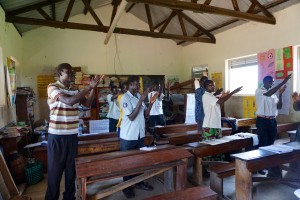 – But the cheekiness is met with great generosity by the attending parents, as they offer to supply the teachers with some land as well as support in the preparation of the land. Filled with motivating appreciation claps for their work, the two-days workshop at St Kizito Bidati ECD centre passed quickly and they look forward to the next workshop, eager to set their CMP into stone.
– But the cheekiness is met with great generosity by the attending parents, as they offer to supply the teachers with some land as well as support in the preparation of the land. Filled with motivating appreciation claps for their work, the two-days workshop at St Kizito Bidati ECD centre passed quickly and they look forward to the next workshop, eager to set their CMP into stone.
From the perspectives of the ‘Juliuses’
Following the workshop, we had the opportunity to talk to a PTA and CMC member who are both called Julius. Find out more about them in the following paragraphs!
Julius #1 – PTA member
We had the opportunity to chat to Julius, a farmer and PTA member at St Kizito Bidati. Four of his five children have already left primary school, but Moses, his youngest, remains and additionally, two of his grandsons, Patience and Emmanuel, from his oldest son, Walter, are currently in K3. Last year, Julius was selected as a PTA member by the community – a position that he has appreciated so far:
“I like it, because I am part of the school, it makes me part of the school. I know how learning is taken place; and above all, my child are also here.”
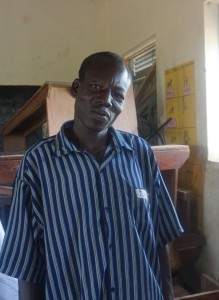 Here is an extract of our feedback-chat:
Here is an extract of our feedback-chat:
What do you think about the performance of the school ?
The school is doing well, but there are certain things that need to be improved on – mostly the parents, who are not doing their part. What do you think of ECD? I am very positive about the ECD, because that is the foundation, for this school to succeed, although there are still challenges with them; there are a few things to be done with the ECD to have that quality.
What do you think of the Jumpstart! project?
For me, the Jumpstart! project is really good, it’s coming to complement what parents are trying to do.
What is best about it?
What I like most about this is the caregivers training, and refresher coursers, the way that teachers are being developed in their skills and are improving each time, because the teachers have demonstrated what they were like before and what they are now. And we, as the management, we were very happy about that. And I think, the impact will go to the children.
What do you think of the workshop?
This workshop is very good. And it wasn’t there before. No one was thinking about it. I now understand the planning – it gives people the opportunity to know what they are supposed to be doing. And I was interested to know more of the different roles of the stakeholders. And I was requesting that such support, if possible, should continue to the leadership of the school, to the management, because it would help them do their work well.
What’s the most important part for you to implement in the CDP?
For me, curriculum delivery is the most important, as well as supporting the teachers, their training and providing the learning materials.
What do you hope for the school?
My hope for this school is to have more caregivers; at least two per class, and this will improve the quality of teaching.
Julius #2 – CMC member
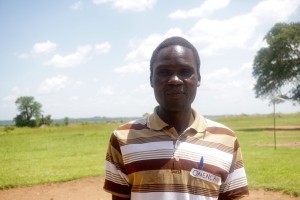 Meet Julius, a 36 year-old farmer from Bidati village in Nyowa district, father of Jacob, Prosie and Fiona, and dedicated member of St.Kitizo Bidati School Central Management Committee ! He was one of the attendees at the two-day Jumpstart! training workshop about developing a Centre Development Plan.
Meet Julius, a 36 year-old farmer from Bidati village in Nyowa district, father of Jacob, Prosie and Fiona, and dedicated member of St.Kitizo Bidati School Central Management Committee ! He was one of the attendees at the two-day Jumpstart! training workshop about developing a Centre Development Plan.
The most important thing that Julius learnt at the training is the importance of planning:
“before the training, the committee was motivated, but not so organised because there was no plan. Now we know who should do what at which time because in the plan everything is detailed – timeframe, goals, responsables, activities. And we are not stopping here – we will meet with other parents to communicate this knowledge.”
Learning how to create action plans has formalised the way the committee works, making them more efficient and productive. Julius is positive that with these new skills, the committee can encourage parents to unite to support the progress of the school.
In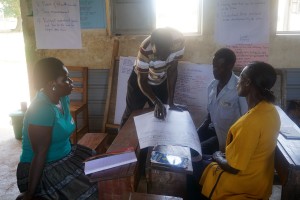 deed, Julius wants to form a committee plan that will raise the standard of education at nursery level, ultimately increasing the quality of teaching and learning and contributing to early childhood development. His belief in the importance of nursery education is based on his own experience as a parent. While his two daughters attended nursery school, his son Jacob did not. The two girls excel at school (Fiona is 1st in her class), often receiving certificates praising their academic performance and organisational skills. However Jacob struggles at school, and has little interest in completing his homework. Julius attributes the educational success of his daughters to their nursery education, which he says helped them to build basic skills and confidence before entering primary level.
deed, Julius wants to form a committee plan that will raise the standard of education at nursery level, ultimately increasing the quality of teaching and learning and contributing to early childhood development. His belief in the importance of nursery education is based on his own experience as a parent. While his two daughters attended nursery school, his son Jacob did not. The two girls excel at school (Fiona is 1st in her class), often receiving certificates praising their academic performance and organisational skills. However Jacob struggles at school, and has little interest in completing his homework. Julius attributes the educational success of his daughters to their nursery education, which he says helped them to build basic skills and confidence before entering primary level.
However, we think that Julius’s dedication to his children’s education has also contributed to this success. He keeps a close eye on his children’s progress both at school and at home, attending ‘lesson day’ each term, a time for parents to attend classes with their children, observe the work scheme and discuss the curriculem with the teachers. Julius regrets leaving school at a young age, so he really values lesson day;
‘I always want to attend, rather than my wife, and sometimes I ask to be set assignments with the children !”
Now that’s dedication ! In the future, he hopes that his children will study hard, but above all “be self-respecting individuals, with careers of their own, who value their jobs”. And he will also do his best to improve the quality of nursery education at Kizito Bidati so that all the students can grow as individuals and have successful careers.
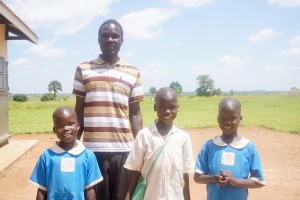
Posted in News |
Tagged Africa, African Revival, ECD, Education, Interview, Nursery, Profile, Pupils, School, School Development, Uganda |
Leave a comment

























 I’ve really achieved a lot by attending this [Jumpstart !] training. In fact yesterday I didn’t sleep. I spent most of the night working on my learning aids, because I felt like if I spend the time now, I will make a lot of things that will help me in class.
I’ve really achieved a lot by attending this [Jumpstart !] training. In fact yesterday I didn’t sleep. I spent most of the night working on my learning aids, because I felt like if I spend the time now, I will make a lot of things that will help me in class.







 parental involvement. And poverty continues to plague the communities in the region, ultimately representing a threat to the mere maintenance of the nursery. However, they hope to tackle these issues by drawing on their strengths, such as dedicated and qualified teachers, committed CMC members, good enrolment and valuable support of the primary section, and exploiting their ‘opportunities’, may it be through cultivating bare school land for meals for the children or bringing more parents as well as children on board through greater community sensitisation.
parental involvement. And poverty continues to plague the communities in the region, ultimately representing a threat to the mere maintenance of the nursery. However, they hope to tackle these issues by drawing on their strengths, such as dedicated and qualified teachers, committed CMC members, good enrolment and valuable support of the primary section, and exploiting their ‘opportunities’, may it be through cultivating bare school land for meals for the children or bringing more parents as well as children on board through greater community sensitisation.


 Meet Julius, a 36 year-old farmer from Bidati village in Nyowa district, father of Jacob, Prosie and Fiona, and dedicated member of St.Kitizo Bidati School Central Management Committee ! He was one of the attendees at the two-day Jumpstart! training workshop about developing a Centre Development Plan.
Meet Julius, a 36 year-old farmer from Bidati village in Nyowa district, father of Jacob, Prosie and Fiona, and dedicated member of St.Kitizo Bidati School Central Management Committee ! He was one of the attendees at the two-day Jumpstart! training workshop about developing a Centre Development Plan.
